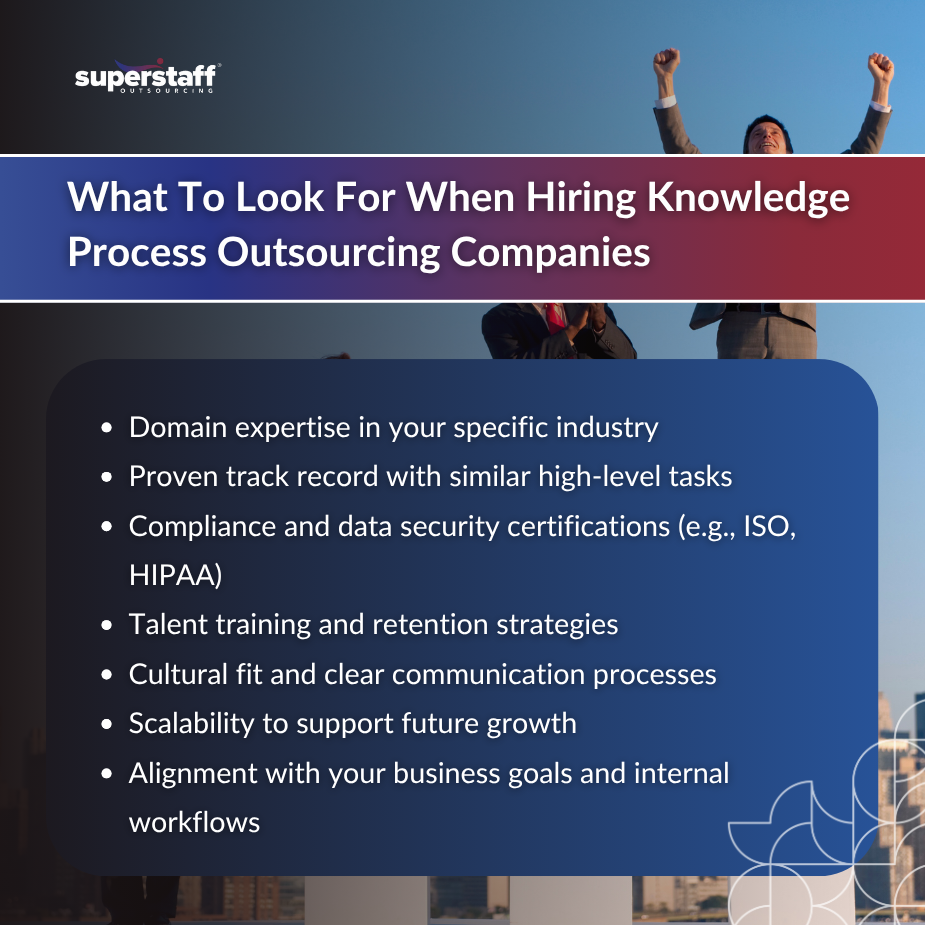
In today’s hyper-competitive landscape, high-stakes decisions can’t rely on generic back-office support alone—they demand precision, insight, and deep domain expertise. That’s where knowledge process outsourcing companies come in. These specialized partners deliver more than task execution; they provide analytical firepower, subject matter expertise, and strategic input that directly influence business outcomes.
As companies face mounting pressure to innovate while controlling operational costs, many are turning to Knowledge Process Outsourcing (KPO) to fill the gap. Whether it’s financial modeling, legal research, market intelligence, or data analytics, KPO enables organizations to access highly skilled talent without the burden of in-house overhead.
Your Full Guide to Choosing a KPO Service Provider
This guide walks you through everything you need to know about selecting and working with the right KPO company—from identifying the right time to outsource, to choosing the right engagement model, to measuring long-term ROI. If you’re a decision-maker aiming for smarter scalability, strategic growth, and sharper insights, this is your blueprint for success.
What Is Knowledge Process Outsourcing (KPO)?
KPO goes beyond traditional outsourcing by offering high-level, domain-specific expertise.
Unlike Business Process Outsourcing (BPO), which focuses on repetitive and transactional tasks (like data entry or customer service), KPO is about bringing specialized knowledge to complex processes that require deep analytical thinking or subject matter insight.
Knowledge process outsourcing companies deliver services such as:
- Legal research and paralegal support
- Financial modeling and equity research
- Data mining, data science, and advanced analytics
- Market intelligence and strategic research
- R&D support in fields like pharmaceuticals and engineering
The key distinction between KPO and BPO lies in the level of intellectual engagement. BPO tasks can typically be standardized and scaled with basic training. KPO services, on the other hand, require staff with professional certifications, advanced degrees, or technical expertise.
Examples of KPO-intensive sectors include:
- Finance: Investment research, risk analytics, actuarial services
- Healthcare: Medical coding, clinical trial data analysis
- Legal: Contract review, case law research
- Technology: Software testing, patent analytics, R&D documentation
At the core of every successful KPO relationship is subject matter expertise. Without it, strategic initiatives like market entry, M&A evaluations, or compliance audits could be compromised.
Understanding what KPO offers sets the stage for identifying when to use it.
Signs Your Business Is Ready for KPO Services
Not every business is ready for KPO—but those aiming to scale intelligently often are.
While the benefits of KPO are undeniable, timing is critical. Engaging a knowledge process outsourcing company too early may lead to underutilization, while engaging too late can slow down growth.
So, how do you know when it’s time?
Here are the telltale signs:
- Your generalists are wearing too many hats. Teams are overloaded with specialized tasks they aren’t trained for, leading to delays or errors.
- You’re hitting bottlenecks in R&D, analytics, or regulatory compliance. These functions require niche knowledge that your team may not possess internally.
- You’re missing opportunities due to lack of insight. Delayed market intelligence or outdated data is costing you a first-mover advantage.
- You want to access global talent without the overhead. KPO allows you to scale up with PhDs, lawyers, analysts, or engineers without permanent hires.
Once you’ve identified the need, the next step is choosing the right partner.

What To Look For in a KPO Partner
The right KPO partner should function as a true extension of your strategic operations.
The value of knowledge process outsourcing companies isn’t just in cheaper labor—it’s in the quality of thinking they bring to the table.
Here’s what to prioritize when evaluating providers:
- Domain Expertise: They should have a proven track record in your industry and deep technical capabilities.
- Data Security and Compliance: Especially if you’re in finance, healthcare, or legal, ask about certifications (e.g., ISO 27001, HIPAA compliance, SOC 2).
- Talent Strategy: Strong KPO providers invest in talent retention, continuous upskilling, and subject-specific training.
- Cultural and Operational Fit: They should understand your business language, values, and communication style.
KPO is more of a strategic partnership than a transactional service. You’ll want a provider who shares your standards and can deliver quality consistently.
Once you’ve narrowed your shortlist, it’s time to evaluate the engagement model.
Choosing the Right Engagement Model for KPO
Your outsourcing structure can make or break your KPO success.
KPO is not one-size-fits-all. Depending on your goals and project scope, different models may work better:
- Staff Augmentation: You retain control of the process while the KPO provider supplies talent. Ideal for short-term or flexible needs.
- Fully Managed Services: The KPO company handles end-to-end execution. Best for ongoing or complex projects requiring dedicated oversight.
- Hybrid Models: Combine the benefits of offshore (cost efficiency) and nearshore (time zone alignment) support.
You should also consider:
- Time-Bound Projects with defined deliverables (e.g., market research for a product launch)
- Ongoing Support for functions like data analytics, compliance monitoring, or legal documentation
The key is to match the engagement model to your operational goals, timelines, and available internal resources.
Smooth onboarding is critical to translate strategy into execution.
How To Seamlessly Onboard a KPO Team
Successful KPO partnerships begin with detailed onboarding and integration.
Even the best knowledge process outsourcing companies can falter if onboarding is rushed or poorly structured. That’s why a thoughtful ramp-up plan is essential.
Here’s what a high-performing onboarding process includes:
- Knowledge Transfer: Set up structured sessions where in-house experts train the KPO team on processes, tools, and brand voice.
- Documentation: Create SOPs, data protocols, and escalation paths.
- Tool Alignment: Ensure both teams are synced via shared dashboards, CRMs, BI platforms, or secure communication tools.
- KPI Definition: Define what success looks like—from accuracy rates to time-to-delivery metrics.
Training is a two-way street. The KPO provider should also offer feedback loops and request clarification when needed. When both sides invest in onboarding, productivity and quality rise faster.
Once operations are underway, measuring ROI ensures continuous improvement.
Measuring the ROI of KPO Services
KPO success isn’t just cost efficiency—it’s about strategic impact.
The performance of knowledge process outsourcing companies should be tied to outcomes, not just activity.
Here’s how to assess return on investment:
- Time-to-Insight Improvements: Are you getting answers faster to support critical decisions?
- Accelerated Product Development or Market Entry: Has your time-to-market shortened thanks to offloaded research or modeling?
- Compliance Risk Reduction: Are there fewer errors or incidents in compliance-heavy functions?
- Cost-Effectiveness: How does the cost of the KPO partnership compare to hiring and retaining equivalent in-house talent?
KPO is a value-generating function. The more integrated your outsourced team becomes, the more measurable their impact will be across multiple departments.
Evaluating long-term value leads to optimization opportunities.
Scaling and Expanding Your KPO Partnership
Once trust is built, KPO can evolve from tactical support to strategic partnership.
Most companies begin by outsourcing one function—then scale once they see consistent results.
Here’s how expansion typically looks:
- Multi-Department Engagements: Start with analytics, then expand to legal research or finance modeling.
- Centers of Excellence: Build dedicated teams with deep expertise who act as innovation engines for your business.
- Cross-Functional Teams: Combine skill sets—such as compliance experts, data analysts, and paralegals—to support complex initiatives.
The best knowledge process outsourcing companies adapt with you, offering flexible contracts, on-demand talent, and continuous skill development.
When executed well, KPO becomes a long-term strategic advantage.
Looking for Reliable Knowledge Process Outsourcing Companies? SuperStaff Is Your Best Bet!
Partnering with a KPO provider can drive innovation, reduce costs, and accelerate competitive advantage—if done thoughtfully.
KPO isn’t just a trend—it’s a smart, future-ready strategy for companies that need high-level thinking without the high overhead. From understanding what knowledge process outsourcing companies offer, to choosing the right engagement model, to scaling strategically, the journey is one of continuous improvement and value creation.
If you’re ready to explore how KPO can give your business an edge, talk to SuperStaff’s knowledge support experts today. Let’s build smarter, together.






